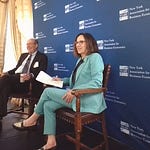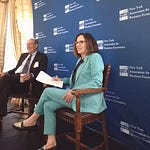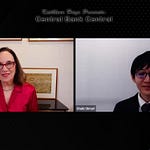There are many famous economists past and present, but how many have a rule named after them? Enter John Taylor. He wrote the famous paper that created the monetary policy targeting rule that quickly became known as The Taylor rule. And one the key takeaways of this over time became a bedrock of Federal Reserve policy, the two percent target.
Professor Taylor is not satisfied with the current to state of monetary policy affairs. Yes great progress has been made in bringing down inflation from its Pandemic peaks, but it has still not yet reached the key 2% target after nearly four years of trying. And many Fed officials are still looking for more rate cuts in coming months, not conditioned on hitting the target.
Dive in and hear, see what he has to say in our discussion where from the start he is adamant that the 2% inflation target must be reached and reached now . Also why the ultimate goal for global central banks needs to be this number. And don’t stop there. He is anti-tariffs, and very pro cutting some taxes and definitely some regulations - and he endorses fiscal probity as strongly.
The Fed pause…do you agree with it? 00:01:35:07 - 00:02:04:03
You know, I don't completely agree. I think they need to get back to their regular pass or possible rates and that really requires an implicit rate of 2%. And where that is, I don't know. But I think 2% is the goal you present is a little above that now above the inflation rate.
Are there inflation risks for the Fed? 00:02:25:05 - 00:02:47:03
….It has to be careful. And that's why I think this goal of 2% for the average inflation rate is still a good thing to aim for. It used to be that way.
Is policy still restrictive? 00:02:47:05 - 00:03:10:20
It may look a little restrictive, but the main thing is to get the <inflation> rate down to two. I say 2% as 2% is a goal.
A 2% real rate, too 00:03:33:05 - 00:03:51:03
But the main thing is the real interest rate is 2% and that gives a guidance. It used to be that way was that way for a time. It's a little bit off at this point. But I think the main thing is to keep it that way. And this is also something that can be followed by <other> central banks as well.
Two percent is important for more than the US 00:04:18:17 - 00:04:47:14
There's things going on around the world as is there's military things as well. But I think that the extent to which the Fed goes to 2% and stays there is best for the rest of the world that's involved in some other countries about a lot of publicity recently, Canada and Mexico as well.
The focal point should be inflation at 2% 00:05:13:06 - 00:05:38:13
The <interest> rate they set depends on many things. It depends on the inflation rate, which is the most important thing and get the inflation rate down to 2%, maybe sometimes goes below 2% until it goes above 2%. But keep it at as close as possible, 2%. That's really what the message should be for monetary policy and not just the U.S., but other countries as well.
Tariffs: Down boy, down! Not up… 00:06:09:12 - 00:06:48:22
We should be getting tariffs down. And that's an old-fashioned way to think about it. The closer to free trade is better, and that's what I've been champion as much as I can throughout my life.
Tariff threats could go wrong… 00:06:48:24 - 00:07:15:18
…they have to be careful about this. There's other countries involved as well. And you can hear the Russians and the Chinese getting a little bit of excited about what they're hearing and we'll see what happens. But it's a very difficult road to hoe, so to speak, and they should be careful what they're doing.
Tariffs have little to offer 00:07:15:18 - 00:07:38:10
They're <tariffs> not going to help. They're not going to do much to further the economy, etc..
Three points main of attack and more- 00:07:38:10 - 00:08:07:11
…those are the three things they have to worry about<monetary policy, fiscal policy, and regulatory policy>. We've talked a lot about monetary policy, but this fiscal policy is very important and regulatory policy as well. So we can get to that stage, if you like. And I didn't mention international. International is very important as well. When you say international- aspects of international - I'm talking about tariffs, I'm talking about balance of payments, talking about all the things that have to do with the way countries interact with each other and some do better than others.
The global Yellow Brick road? 00:08:07:11 - 00:08:34:19
Some <countries> follow a rule, so to speak - is you mentioned having a rule. Well, why not have a global Taylor rule which every central bank follows. And in a way, they're closer to that than they were a few years ago.
Need a consensus to lower tariffs 00:08:35:00 -00:09:24:06
Well, the guidepost for me are very straightforward and that is to get the tariffs down, get the regulations down, to have a more open trading system. That would be a better system than we have at this point. And this is it's not clear we're going in that direction, that's for sure. Seems to be we're going in the other direction. So I think if there's a way that we could agree to both political parties agree to have lower tariffs would be better.
Does missing the 2% target consistently cost credibility?- 00:09:50:18 - 00:10:40:07
Well, it does make you worried, to tell you the truth. I know most of the people who are involved in the decisions, and they always give excuses, always reasons to do somewhat higher…we can't go this far right now… we can… do it later. And so that's the thing that people like me are always working against, and trying to fight, so to speak. But here I would emphasize other central banks as well. The ECB you mentioned, but the others as well. Latin America for sure, and Argentina as well.
ECB needs to be deliberate 00:11:04:07 - 00:11:27:15
What's the risk of that? Well, their situation <the ECB’s> is not as difficult as ours. And there are other countries as well. So I think they should be careful. They should do it in a deliberate way, make it clear what their policy is, and that will all fall into place as well.
Japan is normalizing 00:11:27:17 00:12:12:12
<Japan> They're trying to normalize. Right. And that's okay. They're in a different part of the world as well. But I think they need to normalize and they are beginning to do that as well. In fact, if you think about our discussion now, it's somewhat optimistic that we'll get back to the 2% target globally.
That's what I hope so and so. But of course, it looks like Japan right now is aiming their first goals to get to 1%. They should do it at the right pace. I think the 1%, 2% is the goal they should be looking for.
What is the ‘right pace?’ 00:12:12:14 - 00:12:36:24
Pace depends on the situation. Depends on the international situation. Depends a lot of things, not just what's happening in Japan…
Lesson? Lesson? Clear lesson: get to2%! 00:13:00:03 - 00:13:19:03
What's the lesson from that? What should be taken away and what would you be doing if you were on that framework review board? Well, the lesson is to get back to 2% and it's above now and it's do it gradually, do it at the right pace. There's you know, running the Fed is not easy. A lot of people are involved in it.
Framework to be built on 2% target 00:13:19:05 - 00:13:39:08
Jerome Powell has his fight his debates and he has other central banks as well < to consider>. So, I think the more that they are able to get back to the 2% and the better it will be. And in terms of changing anything, but we're going to assume they're going to stick with the 2% target, Right? They're not going to change that.
Still… it’s about more than just 2% 00:14:04:02 - 00:14:40:15
I think it's very important. You know, there's a so-called rule they have, which is not only the inflation rate, but the state of the economy as well. They have to make sure the economy doesn't go down or up too fast. So those two things keep in mind, and they have to worry about the real interest rate. But that's less of a problem these days. So it's the it's the inflation rate and the state of the economy that I would focus on primarily at this point. And the state of the economy also needs a little bit of action. It's a little bit slow. In my view. It could be faster, but that's not entirely the Fed's job as other people's jobs as well, is know.
There is a policy conundrum 00:15:03:03 - 00:15:24:09
I have heard it many times. And it's not like it's an easy thing to do. They have to decide what the rate should be, should be 25 basis points, 50 basis points. And most important, I've said this several times in this conversation, what is it the central banks are doing as well? It's really one world. And the more that we can understand that, the better it will be.
In a better world? More coordination on goals 00:17:28:11 - 00:18:16:15
…the more that they can central banks get together and decide how to do that <target 2% inflation>, the better off they'll be. So in your dream world, okay, let's say, you know, 2025 is the year or sometime when that would actually a more formal agreement among central banks that this is what we're going to aim for and this is what's going to guide our policies?...there's there is a long way to go from that. There's other kinds of policies as fiscal policy, which we mentioned is regulatory policy. There's international policy. So all of those things have to be part of the equation. But the more that there can be focus on this goal of a lower inflation rate, the better off we'll be.
…and BALANCE the budget!! 00:18:34:05 - 00:19:02:07
The United States. We still have too much spending during COVID. Yes. What's the lesson there? The lesson is to be as close as you can to balancing the budget. And I would I say balance the budget. I mean, literally balance it every minute, every second, every year. But to have a mechanism where it is the revenues get too high, then you change the tax rate or you change spending.
John Taylor
Mary and Robert Raymond Professor, George P. Shultz Senior Fellow of Economics at the Hoover Institution and Senior Fellow at the Stanford Institute for Economic Policy Research
John B. Taylor is the Mary and Robert Raymond Professor of Economics at Stanford University and the George P. Shultz Senior Fellow in Economics at the Hoover Institution. He is Director of the Stanford Introductory Economics Center. He formerly served as director of the Stanford Institute for Economic Policy Research, where he is now a senior fellow.
Taylor’s academic fields of expertise are macroeconomics, monetary economics, and international economics. He is known for his research on the foundations of modern monetary theory and policy, which has been applied by central banks and financial market analysts around the world. He has an active interest in public policy. He served as senior economist on the President’s Council of Economic Advisers from 1976 to 1977, as a member of the President’s Council of Economic Advisers from 1989 to 1991. He was also a member of the Congressional Budget Office’s Panel of Economic Advisers from 1995 to 2001. Taylor served as a member of the California Governor’s Council of Economic Advisors from 1996-98 and 2005-10.
For four years from 2001 to 2005, Taylor served as Under Secretary of Treasury for International Affairs where he was responsible for currency markets, trade in financial services, foreign investment, international debt and development, and oversight of the International Monetary Fund and the World Bank. He was also responsible for coordinating financial policy with the G-7 countries, was chair of the OECD working party on international macroeconomics, and was a Member of the Board of the Overseas Private Investment Corporation. His book Global Financial Warriors: The Untold Story of International Finance in the Post-9/11 World chronicles his years as head of the international division at Treasury. His book Getting Off Track: How Government Actions and Interventions Caused, Prolonged, and Worsened the Financial Crisis was one of the first on the financial crisis, and he has since followed up with two books on preventing future crises, co-editing The Road ahead for the Fed and Ending Government Bailouts As We Know Them. His latest book is First Principles: Five Keys to Restoring Americas’ Prosperity, winner of the 2012 Hayek Prize.
In 2010, Taylor received the Bradley Prize from the Bradley Foundation and the Adam Smith Award from the National Association for Business Economics for his work as a researcher, public servant, and teacher. Taylor was awarded the Alexander Hamilton Award for his overall leadership at the U.S. Treasury, the Treasury Distinguished Service Award for designing and implementing the currency reforms in Iraq, and the Medal of the Republic of Uruguay for his work in resolving the 2002 financial crisis. He was awarded the George P. Shultz Distinguished Public Service Award at Stanford, the Hoagland Prize for excellence in undergraduate teaching and the Rhodes Prize for his high teaching ratings in Stanford’s introductory economics course. He also received a Guggenheim Fellowship for his research, and he is a fellow of the American Academy of Arts and Sciences and the Econometric Society; he formerly served as vice president of the American Economic Association.
Previously, Taylor held positions of professor of economics at Princeton University and Columbia University. Taylor received a B.A. in economics summa cum laude from Princeton University in 1968 and a Ph.D. in economics from Stanford University in 1973.














Share this post